Unit 6 Have you readTreasure Islandyet Section A 课件(共44张PPT)
文档属性
| 名称 | Unit 6 Have you readTreasure Islandyet Section A 课件(共44张PPT) | 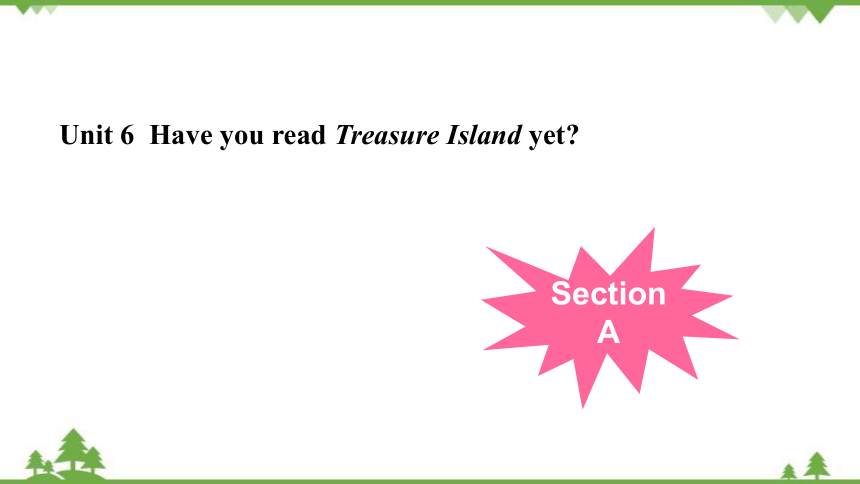 | |
| 格式 | ppt | ||
| 文件大小 | 1.1MB | ||
| 资源类型 | 教案 | ||
| 版本资源 | 鲁教版 | ||
| 科目 | 英语 | ||
| 更新时间 | 2022-10-31 08:53:19 | ||
图片预览

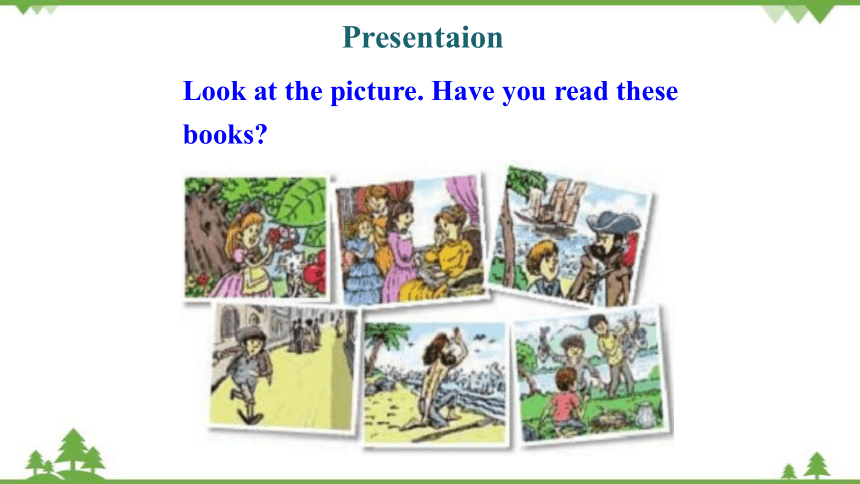

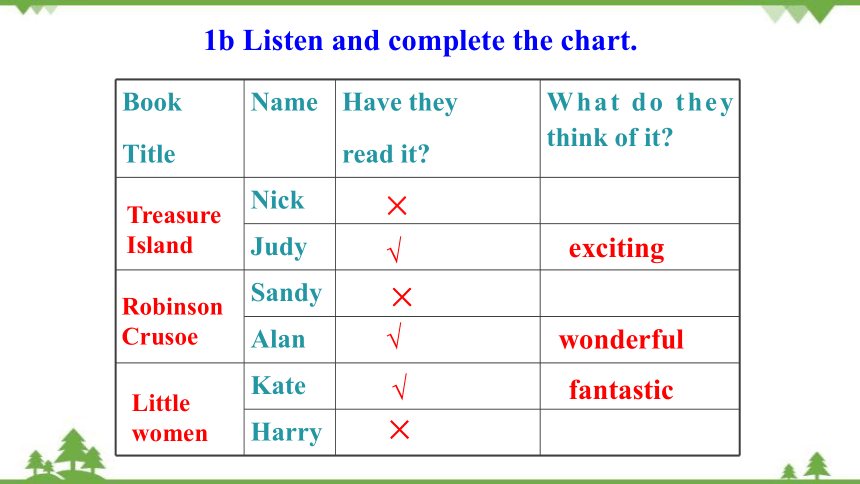
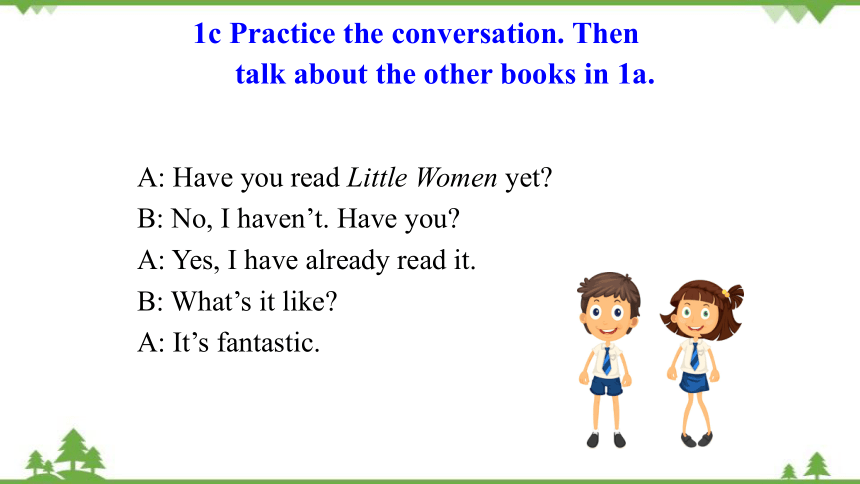
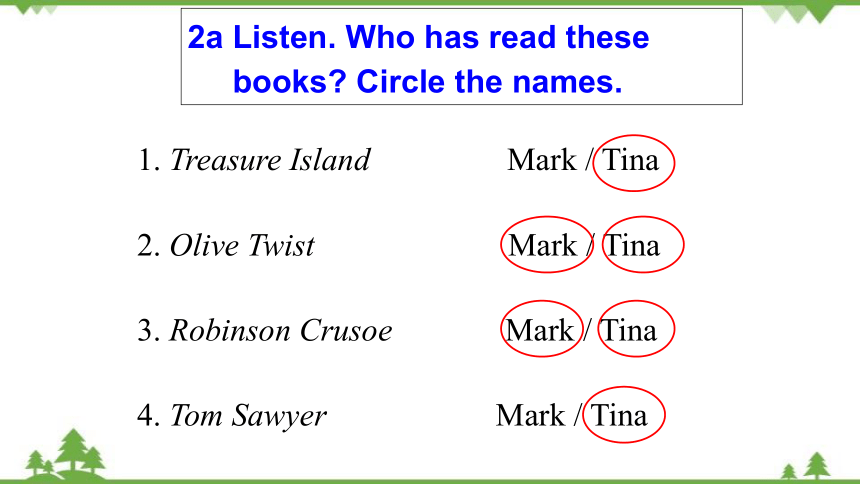
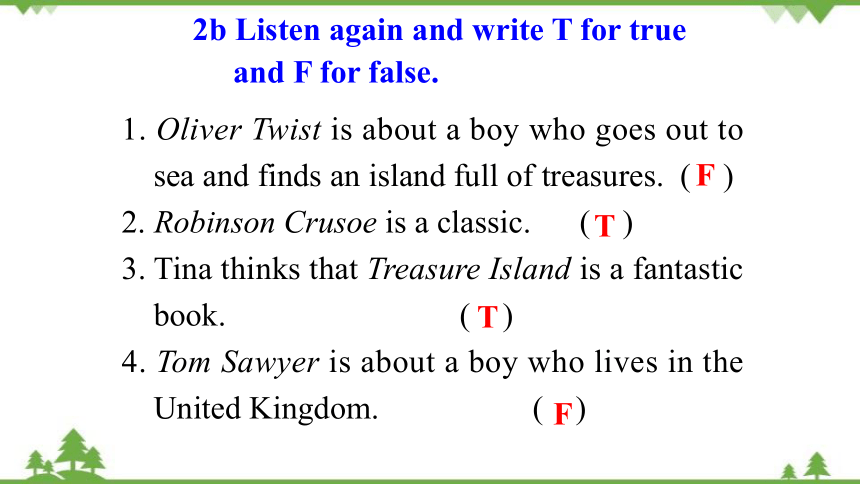
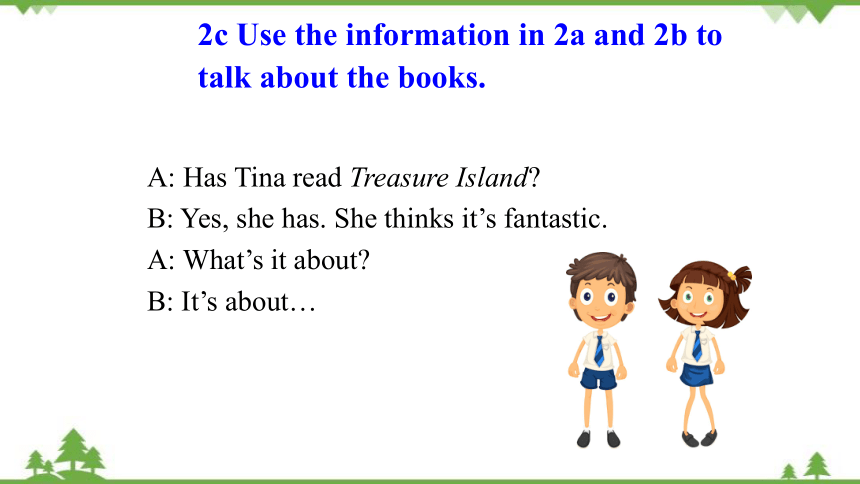
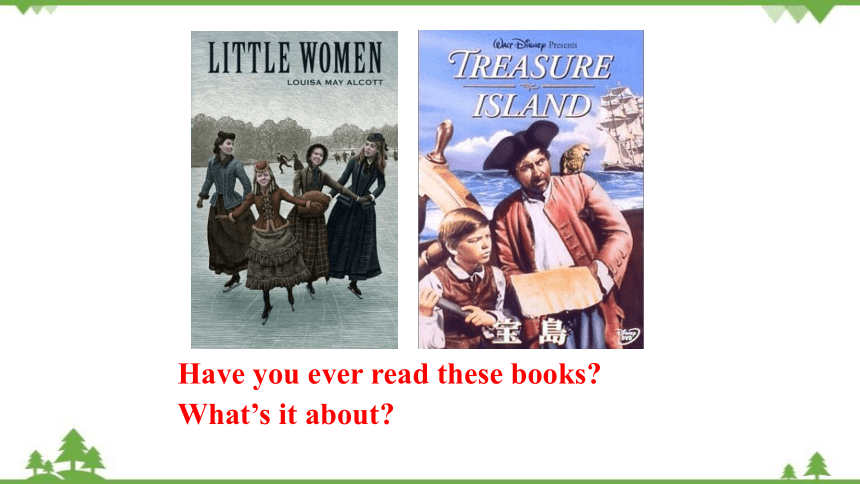

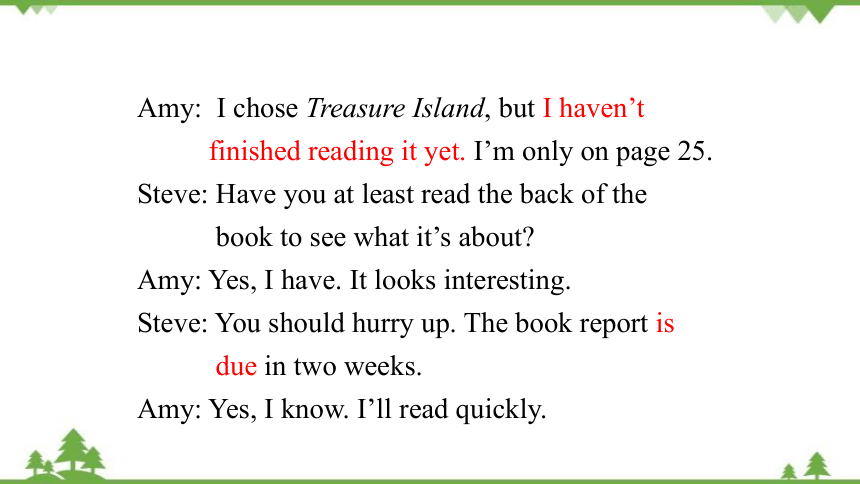
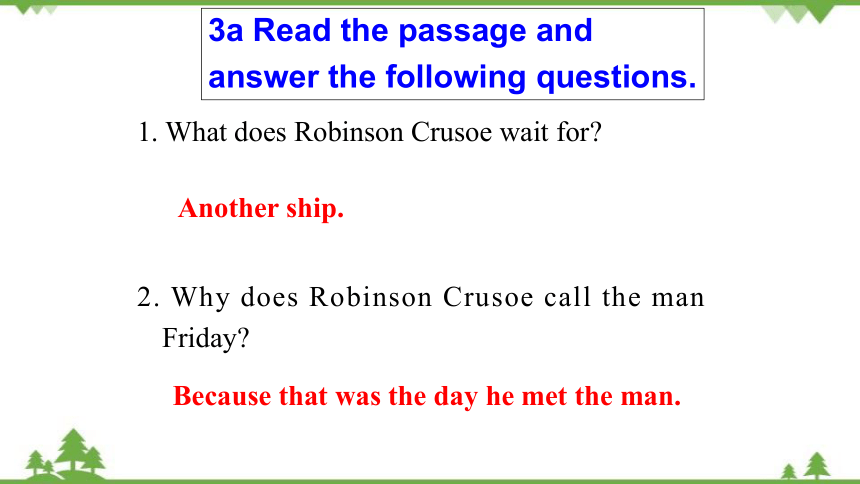
文档简介
(共44张PPT)
Unit 6 Have you read Treasure Island yet
Section A
Look at the picture. Have you read these books
Presentaion
1a Have you heard of these books Check (√) the ones you know.
___ Alice in Wonderland ___ Little Women
___ Treasure Island ___ Olive Twist
___ Robinson Crusoe ___ Tom Sawyer
Book
Title Name Have they
read it What do they think of it
Nick
Judy
Sandy
Alan
Kate
Harry
×
√
√
×
√
×
exciting
wonderful
fantastic
1b Listen and complete the chart.
Treasure Island
Robinson Crusoe
Little women
A: Have you read Little Women yet
B: No, I haven’t. Have you
A: Yes, I have already read it.
B: What’s it like
A: It’s fantastic.
1c Practice the conversation. Then
talk about the other books in 1a.
1. Treasure Island Mark / Tina
2. Olive Twist Mark / Tina
3. Robinson Crusoe Mark / Tina
4. Tom Sawyer Mark / Tina
2a Listen. Who has read these
books Circle the names.
1. Oliver Twist is about a boy who goes out to sea and finds an island full of treasures. ( )
2. Robinson Crusoe is a classic. ( )
3. Tina thinks that Treasure Island is a fantastic book. ( )
4. Tom Sawyer is about a boy who lives in the United Kingdom. ( )
2b Listen again and write T for true
and F for false.
F
F
T
T
A: Has Tina read Treasure Island
B: Yes, she has. She thinks it’s fantastic.
A: What’s it about
B: It’s about…
2c Use the information in 2a and 2b to talk about the books.
Have you ever read these books What’s it about
2d Role-play conversation.
Amy: Steve, have you decided yet which book
to write about for English class
Steve: Yes, Little Women. I’ve already finished
reading it!
Amy: Wow, you’re fast! What’s it about
Steve: It’s about four sisters growing up. It was
really good, so I couldn’t put it down.
Which book did you choose
Amy: I chose Treasure Island, but I haven’t
finished reading it yet. I’m only on page 25.
Steve: Have you at least read the back of the
book to see what it’s about
Amy: Yes, I have. It looks interesting.
Steve: You should hurry up. The book report is
due in two weeks.
Amy: Yes, I know. I’ll read quickly.
3a Read the passage and answer the following questions.
1. What does Robinson Crusoe wait for
2. Why does Robinson Crusoe call the man Friday
Another ship.
Because that was the day he met the man.
3b Read the passage again. Find words that have these meanings.
1. You can use these to shoot things: _____
2. Something you use to travel in the sea: _____
3. A piece of land in the middle of the sea: ______
4. You can use these to cut things: ______
5. Signs left behind by someone or something: ______
guns
ship
island
knives
marks
3c Correct the sentences.
1. Robinson Crusoe arrived on the island
with enough food and drink.
2. Friday made a small boat.
3. Robinson had some food and tools when he
first arrived on the island.
nothing.
Robinson Crusoe made a small boat.
Robinson had nothing when he first arrived on the island.
4. Robinson used the ship to build a house.
5. Friday saw some marks of another man’s
feet on the beach.
6. Robinson tried to kill the two men.
cut down trees to build a house.
Robinson Crusoe saw some marks of another man’s feet on the beach.
Some cannibals tried to kill the two men.
用法
1. 表示过去发生或已经完成的某一动作
对现在造成的影响或结果。
eg:–Have you had your lunch yet
–Yes, I have. I’ve just had it. (现在
我不饿了。)
2. 表示动作或状态从过去某一时刻开始,一直延续到现在,而且可能还要继续下去。eg:I haven’t seen her these days.
现在完成时
时间状语:already, yet, just, ever, never, before
构成
现在完成时是由“助动词have / has+ 动词的过去分词”构成的,规则动词的过去分词构成与过去式相同,不规则动词的过去分词则需逐个记忆。
动词的过去式的变化和过去分词的变化并不完全相同。我们对它们作了一个大致的分类。 (注:例子中单词的变化顺序为:动词原形 → 动词的过去式 → 动词的过去分词)
一、过去式和过去分词的变化相同
规则变化:
1. 一般在动词词尾直接加ed。如:
pick → picked → picked; wish → wished → wished; stay → stayed → stayed
2. 以不发音的e结尾的动词后面加d。如:like → liked → liked; hope → hoped → hoped; phone → phoned → phoned
3. 以“辅音字母 + y”结尾的动词,变y为i,再加-ed。如:
study → studied → studied; hurry → hurried → hurried; reply → replied → replied
4. 词尾只有一个辅音字母的重读闭音节动词,要双写辅音字母,再加-ed。如:stop → stopped → stopped; clap → clapped → clapped
不规则变化:
5. 以不变应万变。如:
let → let → let; put → put → put; read → read → read
6. 若中间有双写e,则去掉一个e,单词末尾再加t。如:
feel → felt → felt; keep → kept → kept; sleep → slept → slept
7. 结尾的字母d变t。如:
lend → lent → lent; build → built → built; send → sent → sent
8. 变为以-ought或-aught结尾。如:
buy → bought → bought; bring → brought → brought; catch → caught → caught; teach → taught → taught
句式
1. 肯定句:主语 + have / has + 过去分词 (+ 其他)
2. 否定句:主语 + have / has + not + 过去
分词(+ 其他)
3. 一般疑问句:have/ has + 主语 + 过去
分词(+ 其他)
4. 特殊疑问句:
1)特殊疑问词 (不是句子主语) + have / has +
主语+过去分词 (+ 其他)
2) 特殊疑问词(是句子主语)+have / has+
过去分词(+ 其他)
already和yet都可以作为现在完成时的标
志词,但它们的用法不同。
◆already一般用于肯定句中。
eg:
We have already cleaned up our classroom.
注意:already用于疑问句中时通常表示惊奇。
eg:
Have you finished your homework already I can’t believe it.
◆yet一般用于疑问句和否定句中。
eg:
Have you seen her yet
The bus hasn’t come yet.
1. A: Would you like something to drink
B: No, thanks. _______________________.
(just/ drink some tea)
2. A: I heard you lost your key.
____________________ (find)
B: No, not yet.
I have just drunk some tea
Have you found it
4a Use the words in brackets to
complete the conversations.
3. A: Do you know when Tom is leaving
B: ________________________.
(already/ leave)
A: When ___________________ (leave)
B: This morning.
4. A: Is your sister going to the movies
with us tonight
B: No. __________________________.
(already/ see the film)
He has already left
did he leave
She has already seen the film
5. A: What do your parents think about
our plan
B: I __________________. (not/ tell
them/yet)
haven’t told them yet
Sally ____ (love) reading. In the morning she reads the newspaper and in the evening she reads books. She ___ already ____ (read) more than 100 different books. Her favorite kind of books is science fiction. She is interested in science and technology and loves to imagine what the world ______ (be) like in 50 years.
loves
has
read
will be
4b Fill in the blanks with the correct forms of the words in the brackets.
She _______ (finish) reading a book about robots last week and _________ (write) a book report about it next week for her French class. Every time she is in the library, Sally looks at the many books she __________ (not read) yet and she can’t wait to read them.
finished
will write
hasn’t read
4c Complete the chart with
information about you and your
friend.
A: What books have you already read
B: I have already read Tom Sawyer and
Harry Potter.
A: What do you think of them
B: Well, I think Harry Potter was exciting,
but Tom Sawyer was a bit boring.
You Your friend Comments
Books I have already read
Movies I have already seen
Songs I have already heard
1. Oliver Twist is about a boy who goes out to sea and finds an island full of treasures. 《雾都孤儿》是一个男孩去海边发现一个充满珍宝的岛的故事。
full of 满是……的;(有)大量的
eg:The area is full of beautiful lakes
and rivers.
这个区域有大量美丽的湖泊和河流。
Language Points
2. Have you at least read the back of the book to see what it’s about
至少你已经读过书的背面,了解了它的大致内容吧?
此句中的动词see表示“(通过查看、打听等)弄清、了解;查看、发现(信息或事实)”。作这种用法时,see常接how, what, when等引导的宾语从句。
eg: He agreed to go with me to see what was wrong.
他同意跟我去了解一下毛病出在哪里。
First of all, we need to take some time to see how it works.
首先,我们需要花些时间了解一下它是如何运作的。
3. Steve: …The book report is due in two
weeks.
Amy: Yes, I know… 是的,我知道…
1) due adj. 预定;预期;预计
后边引出预期的时间、地点等,还常常构成短语be due (to do something)或be due (for something)。
eg:Our plane is due at Shanghai Hongqiao International Airport at 12:30.
我们的飞机预计于12:30降落在上海虹桥国际机场。
Rose is due to start school in January.
罗丝一月份就要开始上学了。
You are due for a medical examination next month.
你的身体检查预定在下个月。
2) I know表示说话人对所谈的观点、内容已了解,无需多说,相当于汉语中“我早知道了;我全都了解”这样的意思,区别于许多日常交际场合中表示“我明白了;我知道了;我懂了”的用法。
eg:A: It’s already very late. You should get some rest.
已经很晚了,你应该休息了。
B: Well, I know. Thanks.
对,我是知道的。谢谢。
4. Although I have lost everything, I have not lost my life.
虽然我失去了一切,但是没有失去生命。
although“虽然,尽管”,引导让步状语从句,不能与but连用。
eg: He is young, but he works hard.
他年龄小,但是工作很努力。
5. So I will not give up and I will wait for another ship.
因此我不放弃,要等候另一只船。
another 既可用作形容词,也可用作代词。用作形容词时,意思是“又一的;再一的”,修饰名词,位于名词前;用作代词时,意思是“另一个”。
eg: Just at that time, another man came in.
Saying is one thing and doing is another.
another还可以和数词连用,常放在数词的前面,意为“还;再;又”。
eg: We need another three man to
help do the work.
6. Not long after that, I saw some cannibals trying to kill two men from a broken ship.
在那之后不久,我看见一些食人肉者在试图杀死两个来自破船上的人。
see sb. doing sth.意为“看到某人正在做
某事”,强调看到的动作正在进行。
eg: Mary saw him cleaning the classroom. 玛丽看见他正在打扫教室。
see sb. do sth. 意为“看到某人做了某事”,强调看到动作的全过程。
eg: Mary saw him clean the classroom.
玛丽看见他打扫教室了。
Retell what you did yesterday.
Homework
Unit 6 Have you read Treasure Island yet
Section A
Look at the picture. Have you read these books
Presentaion
1a Have you heard of these books Check (√) the ones you know.
___ Alice in Wonderland ___ Little Women
___ Treasure Island ___ Olive Twist
___ Robinson Crusoe ___ Tom Sawyer
Book
Title Name Have they
read it What do they think of it
Nick
Judy
Sandy
Alan
Kate
Harry
×
√
√
×
√
×
exciting
wonderful
fantastic
1b Listen and complete the chart.
Treasure Island
Robinson Crusoe
Little women
A: Have you read Little Women yet
B: No, I haven’t. Have you
A: Yes, I have already read it.
B: What’s it like
A: It’s fantastic.
1c Practice the conversation. Then
talk about the other books in 1a.
1. Treasure Island Mark / Tina
2. Olive Twist Mark / Tina
3. Robinson Crusoe Mark / Tina
4. Tom Sawyer Mark / Tina
2a Listen. Who has read these
books Circle the names.
1. Oliver Twist is about a boy who goes out to sea and finds an island full of treasures. ( )
2. Robinson Crusoe is a classic. ( )
3. Tina thinks that Treasure Island is a fantastic book. ( )
4. Tom Sawyer is about a boy who lives in the United Kingdom. ( )
2b Listen again and write T for true
and F for false.
F
F
T
T
A: Has Tina read Treasure Island
B: Yes, she has. She thinks it’s fantastic.
A: What’s it about
B: It’s about…
2c Use the information in 2a and 2b to talk about the books.
Have you ever read these books What’s it about
2d Role-play conversation.
Amy: Steve, have you decided yet which book
to write about for English class
Steve: Yes, Little Women. I’ve already finished
reading it!
Amy: Wow, you’re fast! What’s it about
Steve: It’s about four sisters growing up. It was
really good, so I couldn’t put it down.
Which book did you choose
Amy: I chose Treasure Island, but I haven’t
finished reading it yet. I’m only on page 25.
Steve: Have you at least read the back of the
book to see what it’s about
Amy: Yes, I have. It looks interesting.
Steve: You should hurry up. The book report is
due in two weeks.
Amy: Yes, I know. I’ll read quickly.
3a Read the passage and answer the following questions.
1. What does Robinson Crusoe wait for
2. Why does Robinson Crusoe call the man Friday
Another ship.
Because that was the day he met the man.
3b Read the passage again. Find words that have these meanings.
1. You can use these to shoot things: _____
2. Something you use to travel in the sea: _____
3. A piece of land in the middle of the sea: ______
4. You can use these to cut things: ______
5. Signs left behind by someone or something: ______
guns
ship
island
knives
marks
3c Correct the sentences.
1. Robinson Crusoe arrived on the island
with enough food and drink.
2. Friday made a small boat.
3. Robinson had some food and tools when he
first arrived on the island.
nothing.
Robinson Crusoe made a small boat.
Robinson had nothing when he first arrived on the island.
4. Robinson used the ship to build a house.
5. Friday saw some marks of another man’s
feet on the beach.
6. Robinson tried to kill the two men.
cut down trees to build a house.
Robinson Crusoe saw some marks of another man’s feet on the beach.
Some cannibals tried to kill the two men.
用法
1. 表示过去发生或已经完成的某一动作
对现在造成的影响或结果。
eg:–Have you had your lunch yet
–Yes, I have. I’ve just had it. (现在
我不饿了。)
2. 表示动作或状态从过去某一时刻开始,一直延续到现在,而且可能还要继续下去。eg:I haven’t seen her these days.
现在完成时
时间状语:already, yet, just, ever, never, before
构成
现在完成时是由“助动词have / has+ 动词的过去分词”构成的,规则动词的过去分词构成与过去式相同,不规则动词的过去分词则需逐个记忆。
动词的过去式的变化和过去分词的变化并不完全相同。我们对它们作了一个大致的分类。 (注:例子中单词的变化顺序为:动词原形 → 动词的过去式 → 动词的过去分词)
一、过去式和过去分词的变化相同
规则变化:
1. 一般在动词词尾直接加ed。如:
pick → picked → picked; wish → wished → wished; stay → stayed → stayed
2. 以不发音的e结尾的动词后面加d。如:like → liked → liked; hope → hoped → hoped; phone → phoned → phoned
3. 以“辅音字母 + y”结尾的动词,变y为i,再加-ed。如:
study → studied → studied; hurry → hurried → hurried; reply → replied → replied
4. 词尾只有一个辅音字母的重读闭音节动词,要双写辅音字母,再加-ed。如:stop → stopped → stopped; clap → clapped → clapped
不规则变化:
5. 以不变应万变。如:
let → let → let; put → put → put; read → read → read
6. 若中间有双写e,则去掉一个e,单词末尾再加t。如:
feel → felt → felt; keep → kept → kept; sleep → slept → slept
7. 结尾的字母d变t。如:
lend → lent → lent; build → built → built; send → sent → sent
8. 变为以-ought或-aught结尾。如:
buy → bought → bought; bring → brought → brought; catch → caught → caught; teach → taught → taught
句式
1. 肯定句:主语 + have / has + 过去分词 (+ 其他)
2. 否定句:主语 + have / has + not + 过去
分词(+ 其他)
3. 一般疑问句:have/ has + 主语 + 过去
分词(+ 其他)
4. 特殊疑问句:
1)特殊疑问词 (不是句子主语) + have / has +
主语+过去分词 (+ 其他)
2) 特殊疑问词(是句子主语)+have / has+
过去分词(+ 其他)
already和yet都可以作为现在完成时的标
志词,但它们的用法不同。
◆already一般用于肯定句中。
eg:
We have already cleaned up our classroom.
注意:already用于疑问句中时通常表示惊奇。
eg:
Have you finished your homework already I can’t believe it.
◆yet一般用于疑问句和否定句中。
eg:
Have you seen her yet
The bus hasn’t come yet.
1. A: Would you like something to drink
B: No, thanks. _______________________.
(just/ drink some tea)
2. A: I heard you lost your key.
____________________ (find)
B: No, not yet.
I have just drunk some tea
Have you found it
4a Use the words in brackets to
complete the conversations.
3. A: Do you know when Tom is leaving
B: ________________________.
(already/ leave)
A: When ___________________ (leave)
B: This morning.
4. A: Is your sister going to the movies
with us tonight
B: No. __________________________.
(already/ see the film)
He has already left
did he leave
She has already seen the film
5. A: What do your parents think about
our plan
B: I __________________. (not/ tell
them/yet)
haven’t told them yet
Sally ____ (love) reading. In the morning she reads the newspaper and in the evening she reads books. She ___ already ____ (read) more than 100 different books. Her favorite kind of books is science fiction. She is interested in science and technology and loves to imagine what the world ______ (be) like in 50 years.
loves
has
read
will be
4b Fill in the blanks with the correct forms of the words in the brackets.
She _______ (finish) reading a book about robots last week and _________ (write) a book report about it next week for her French class. Every time she is in the library, Sally looks at the many books she __________ (not read) yet and she can’t wait to read them.
finished
will write
hasn’t read
4c Complete the chart with
information about you and your
friend.
A: What books have you already read
B: I have already read Tom Sawyer and
Harry Potter.
A: What do you think of them
B: Well, I think Harry Potter was exciting,
but Tom Sawyer was a bit boring.
You Your friend Comments
Books I have already read
Movies I have already seen
Songs I have already heard
1. Oliver Twist is about a boy who goes out to sea and finds an island full of treasures. 《雾都孤儿》是一个男孩去海边发现一个充满珍宝的岛的故事。
full of 满是……的;(有)大量的
eg:The area is full of beautiful lakes
and rivers.
这个区域有大量美丽的湖泊和河流。
Language Points
2. Have you at least read the back of the book to see what it’s about
至少你已经读过书的背面,了解了它的大致内容吧?
此句中的动词see表示“(通过查看、打听等)弄清、了解;查看、发现(信息或事实)”。作这种用法时,see常接how, what, when等引导的宾语从句。
eg: He agreed to go with me to see what was wrong.
他同意跟我去了解一下毛病出在哪里。
First of all, we need to take some time to see how it works.
首先,我们需要花些时间了解一下它是如何运作的。
3. Steve: …The book report is due in two
weeks.
Amy: Yes, I know… 是的,我知道…
1) due adj. 预定;预期;预计
后边引出预期的时间、地点等,还常常构成短语be due (to do something)或be due (for something)。
eg:Our plane is due at Shanghai Hongqiao International Airport at 12:30.
我们的飞机预计于12:30降落在上海虹桥国际机场。
Rose is due to start school in January.
罗丝一月份就要开始上学了。
You are due for a medical examination next month.
你的身体检查预定在下个月。
2) I know表示说话人对所谈的观点、内容已了解,无需多说,相当于汉语中“我早知道了;我全都了解”这样的意思,区别于许多日常交际场合中表示“我明白了;我知道了;我懂了”的用法。
eg:A: It’s already very late. You should get some rest.
已经很晚了,你应该休息了。
B: Well, I know. Thanks.
对,我是知道的。谢谢。
4. Although I have lost everything, I have not lost my life.
虽然我失去了一切,但是没有失去生命。
although“虽然,尽管”,引导让步状语从句,不能与but连用。
eg: He is young, but he works hard.
他年龄小,但是工作很努力。
5. So I will not give up and I will wait for another ship.
因此我不放弃,要等候另一只船。
another 既可用作形容词,也可用作代词。用作形容词时,意思是“又一的;再一的”,修饰名词,位于名词前;用作代词时,意思是“另一个”。
eg: Just at that time, another man came in.
Saying is one thing and doing is another.
another还可以和数词连用,常放在数词的前面,意为“还;再;又”。
eg: We need another three man to
help do the work.
6. Not long after that, I saw some cannibals trying to kill two men from a broken ship.
在那之后不久,我看见一些食人肉者在试图杀死两个来自破船上的人。
see sb. doing sth.意为“看到某人正在做
某事”,强调看到的动作正在进行。
eg: Mary saw him cleaning the classroom. 玛丽看见他正在打扫教室。
see sb. do sth. 意为“看到某人做了某事”,强调看到动作的全过程。
eg: Mary saw him clean the classroom.
玛丽看见他打扫教室了。
Retell what you did yesterday.
Homework
同课章节目录
- Unit 1 Could you please clean your room?
- Section A
- Section B
- Unit 2 Why don't you talk to your parents?
- Section A
- Section B
- Unit 3 What were you doing when the rainstorm came
- Section A
- Section B
- Unit 4 An old man tried to move the mountains.
- Section A
- Section B
- Unit 5 What's the highest mountain in the world?
- Section A
- Section B
- Unit 6 Have you read Treasure Island yet?
- Section A
- Section B
- Unit 7 Have you ever been to a museum?
- Section A
- Section B
- Unit 8 I've had this bike for three years.
- Section A
- Section B
